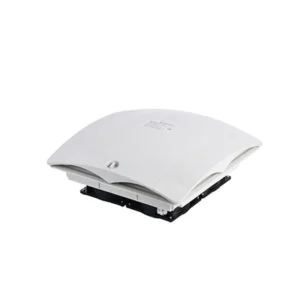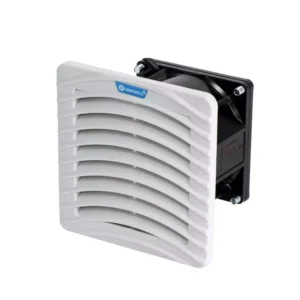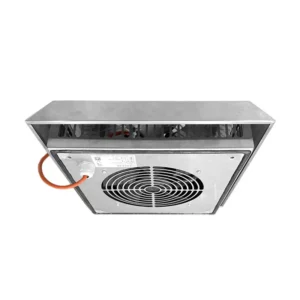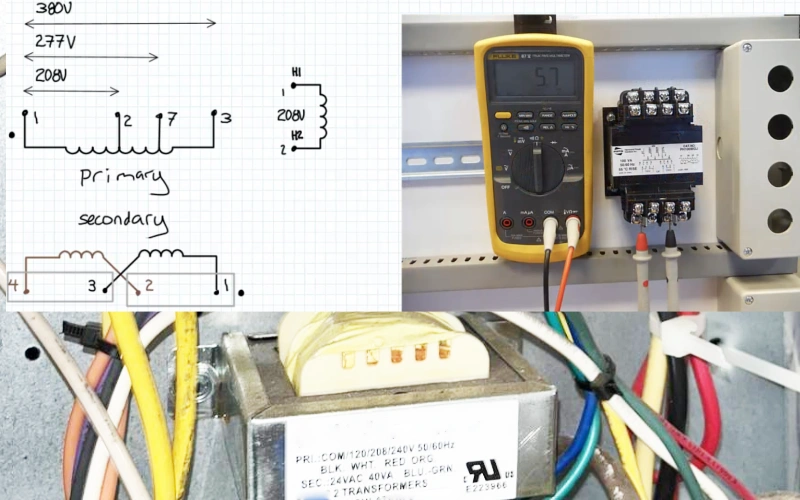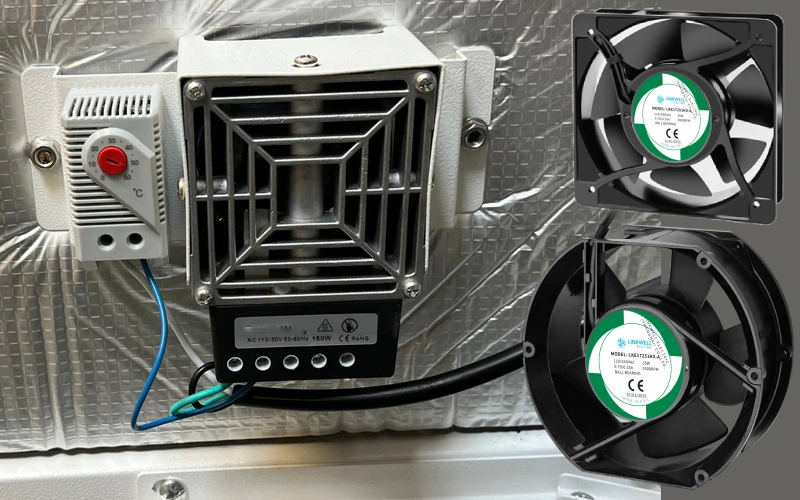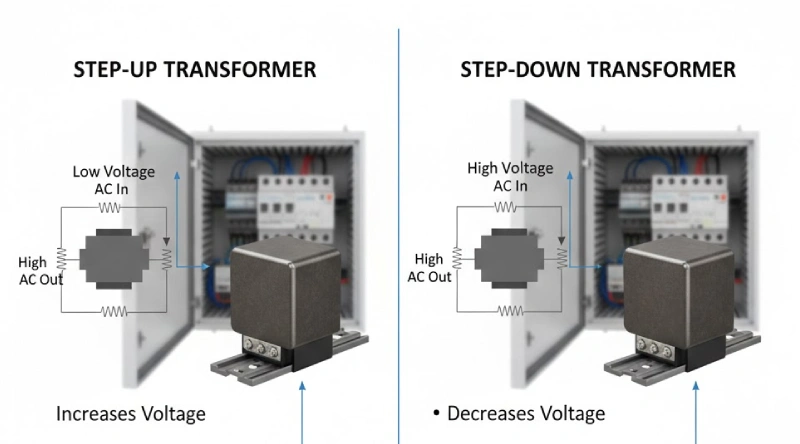If you want cleaner, safer air in your facility, an FFU is your best bet. You get top-notch air quality and better safety for your equipment and your team. Unlike old-school systems, an FFU gives you powerful, targeted filtration right where you need it. Linkwell brings decades of expertise in the fan filter unit industry, so you know you’re getting proven solutions. Industrial spaces face tough air quality challenges every day, but with the right FFU, you can tackle dust, moisture, and heat with confidence.
FFU Key Takeaways
- FFUs provide powerful, targeted air filtration that improves air quality and safety in industrial spaces.
- Linkwell’s FFUs use high-efficiency filters and energy-saving designs to reduce costs and protect equipment.
- Modular FFUs are easy to install, maintain, and scale to fit different clean room and industrial needs.
- FFUs outperform traditional systems by delivering cleaner air, saving energy, and supporting strict safety standards.
- Linkwell offers durable outdoor enclosures and expert support to keep your equipment safe in harsh environments.
FFU Overview
What Is an FFU
You might wonder what makes an FFU different from other air systems. An FFU, or fan filter unit, is a compact device that combines a fan and a filter in one package. You often see these units in clean rooms, control cabinets, and industrial spaces where air quality matters most. Unlike a traditional air handling unit, an FFU gives you targeted filtration right where you need it.
Here’s what you’ll find inside a typical FFU:
- A sturdy shell made from anti-corrosion materials like aluminum-coated zinc plate.
- A high-efficiency HEPA filter that traps tiny particles.
- A built-in fan (or blower) that keeps air moving.
- A split design for the shell and filter, making installation and replacement simple.
- A microprocessor control system for energy savings and low noise.
- A blower that can last up to 100,000 hours with almost no maintenance.
- Modular construction, so you can use one FFU or connect several for bigger projects.
You can use a clean room ffu by itself or link several together for assembly lines or large spaces. This flexibility makes it easy to fit FFUs into many different setups.
How FFU Works
The way an FFU works is pretty straightforward, but it’s also very effective. The fan inside the unit draws in air from the environment. First, the air passes through a pre-filter that catches larger dust and debris. Next, the air moves through a HEPA or ULPA filter, which removes even smaller contaminants. The clean room ffu then releases purified air in a smooth, laminar flow, which helps keep the area free from turbulence and contamination.
- FFUs use advanced filters to achieve the high air purity needed for clean rooms.
- The fan motor keeps air moving steadily, so you always get uniform airflow.
- The design keeps energy use low and noise to a minimum, making your workspace more comfortable.
You get a system that not only protects your equipment but also creates a safer, cleaner environment for everyone. With a clean room ffu, you can meet strict industry standards and keep your operations running smoothly.
Industrial Air Filtration Needs
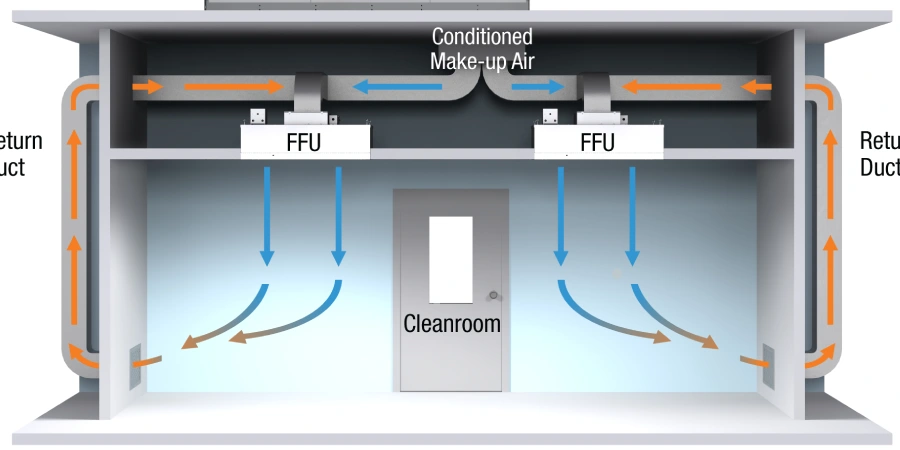
Challenges in Industry
You face some tough air quality challenges in industrial spaces. Dust, moisture, and temperature swings can make your job harder every day. In places like Northeast China, studies show that particulate matter—PM2.5 and PM10—often spikes because of humidity and temperature changes. High humidity makes particles heavier, so they settle faster, but moisture can also change how these particles move through the air. You might notice that sensors need frequent calibration because humidity causes them to drift. Seasonal changes, like temperature inversions, can trap pollutants and make things worse.
Tip: If you work in demanding manufacturing environments, you know that keeping air clean is not just about comfort. It’s about protecting sensitive equipment and keeping your team safe.
Here’s a quick look at what you’re up against:
- Dust and particulate matter clog up machinery and electronics.
- Moisture leads to corrosion and electrical faults.
- Temperature fluctuations stress your systems and affect air quality.
- Indoor and outdoor humidity can interact, letting more pollutants sneak inside.
Linkwell understands these challenges. The company has worked with industries around the world, from energy storage to robotics, providing industrial air filtration solutions that fit each unique situation.
Why Standard Solutions Fall Short
You might think a basic filter or a standard HVAC system will do the trick. In reality, traditional air filtration methods often miss the mark in industrial settings. Standard filters usually max out at about 63% efficiency, which means a lot of particles still get through. As filters get dirty, they block airflow and force your system to work harder, driving up energy costs. Some newer technologies, like dry hydrogen peroxide or low wattage UV light, sound promising but don’t always deliver safe or effective results.
- Standard filters struggle with high dust loads and moisture.
- Energy use goes up as filters clog, hurting your bottom line.
- Acoustic impacts and uneven temperatures can disrupt your workspace.
- Many new technologies only supplement mechanical filtration, not replace it.
You need a solution that goes beyond the basics. Linkwell’s tailored approach to industrial air filtration helps you tackle these issues head-on, keeping your facility running smoothly and your air quality at its best.
Linkwell FFU Features
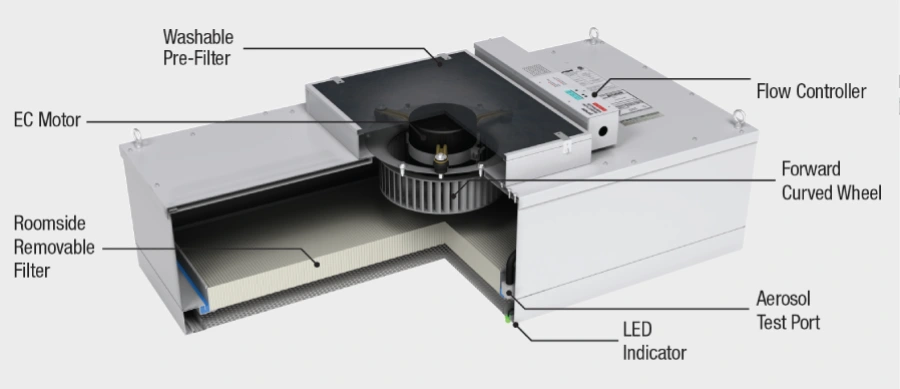
High-Performance Filtration
When you need serious air cleaning power, high horsepower ffus from Linkwell step up to the challenge. These units use advanced filtration technology to trap dust, moisture, and even the smallest airborne particles. You get a high-efficiency particulate filter that meets strict industry standards, so your workspace stays clean and safe. Linkwell tests every ffu for airflow uniformity and particle count, making sure you get reliable results every time.
You might wonder how these high horsepower ffus handle tough environments. The answer lies in their design. Each unit features a tightly sealed filter and a powerful fan that work together to keep contaminants out. You can trust these high static pressure ffus to maintain clean air, even when dust loads are high or conditions are harsh. The modular setup lets you scale up your filtration system as your needs grow.
Note: High horsepower ffus don’t just protect your equipment—they help you meet strict air quality standards in industries like biotech, electronics, and manufacturing.
Energy Efficiency
Saving energy is a big deal in any facility. Linkwell’s high horsepower ffus make it easy. You’ll notice lower power bills thanks to their smart design. For example, switching to these units in a biotech lab saved 28,000 kWh in one year. That’s a huge difference compared to traditional systems.
Here’s how Linkwell’s high horsepower ffus keep energy use low:
- Patented airflow ducts improve heat dissipation by 15%.
- Continuous fan operation, paired with less frequent air conditioning, cuts compressor runtime by half.
- Filters last up to 6,000 hours, so you replace them less often.
- Modular installation means you only run what you need, reducing waste.
The secret is in the details. Linkwell uses eco-friendly ABS plastic for durability and smart airflow designs that block pollutants but keep air moving. German-engineered fans run quietly and efficiently, so you get strong cooling without the noise or high energy costs. High static pressure ffus also help maintain stable temperatures, which means your equipment runs better and lasts longer.
Easy Installation
You don’t want to waste time on complicated setups. Linkwell’s high horsepower ffus make installation simple. Each unit comes with clear instructions, mounting gaskets, and all the hardware you need. The modular design lets you add or remove units as your needs change, so you stay flexible.
Cleaning and maintenance are just as easy. The impact-resistant ABS covers pop off for quick filter changes. You can clean the units without special tools, and the waterproof design keeps moisture out. This means less downtime and fewer headaches for your team.
Tip: If you need to expand your filtration system, just add more high horsepower ffus. The process is quick, and you won’t disrupt your workflow.
Certifications and Reliability
You want equipment you can trust. Linkwell’s high horsepower ffus come with top international certifications, so you know they meet strict safety and quality standards.
| Certification | What It Means for You |
|---|---|
| CE | Meets European health, safety, and environmental rules |
| RoHS | Free from hazardous substances, safer for the environment |
| ISO | Follows global quality management standards |
| UL | Guarantees operational safety and reliability |
These certifications show that Linkwell’s filtration solutions are built for demanding environments. The IP54 rating means your ffu stands up to dust and water, while the EMC certification ensures safe operation around sensitive electronics. You get peace of mind knowing your high horsepower ffus will keep running, even in tough conditions.
By choosing Linkwell, you extend the life of your equipment and cut down on maintenance costs. The waterproof covers prevent water and dust from getting inside, so your machines stay cleaner and last longer. You spend less time fixing problems and more time focusing on your work.
FFU vs. Traditional Systems
Filtration Performance
When you compare filtration performance, you see a clear difference between fan filter units and traditional systems. FFUs deliver precise, localized air cleaning. They use high-efficiency filters like HEPA or ULPA, which trap almost every tiny particle. You get up to 99.97% removal for 0.3-micron particles with HEPA, and even better with ULPA. Traditional HVAC systems focus more on comfort and broad air movement. They might use filters, but they rarely match the strict standards needed for cleanrooms or sensitive manufacturing.
Take a look at this comparison:
| Metric | Fan Filter Units (FFUs) | Traditional HVAC Systems |
|---|---|---|
| Filtration Efficiency | HEPA: 99.97% for 0.3 micron; ULPA: 99.999% for 0.12 micron | Lower focus on HEPA/ULPA; general air quality |
| Airflow Delivery | Localized, laminar airflow | General, less precise airflow |
| Energy Consumption | Up to 40% energy savings | Higher due to ductwork and less targeted airflow |
| Contamination Control | Superior for cleanrooms | Less effective for strict contamination control |
You want the best air purity for your workspace. FFUs give you that edge. They keep your environment cleaner and safer, especially when strict contamination control matters most.
Cost and Maintenance
You care about costs and downtime. FFUs help you save money in the long run. They are easier and cheaper to install than traditional systems. You can add more units as your needs grow, so you never overpay for extra capacity. The modular design means you only run what you need, which cuts energy bills.
Here’s how FFUs help you save:
- Lower installation costs and less disruption during setup.
- Modular scalability lets you expand as needed.
- Energy-saving motors reduce utility bills.
- Simple maintenance with tool-free access and visual filter indicators.
- Longer service life, so you replace parts less often.
A real-world example shows the impact. At a large grain facility, switching to advanced filter media cut pressure drop and doubled filter life. This change saved over $77,000 a year and paid for itself in just a few months. When you use FFUs, you also get predictable maintenance. You clean pre-filters every few months and replace HEPA filters every year or two. You don’t need to shut down your whole system for service. If one unit needs work, the rest keep running.
Tip: FFUs help you avoid costly downtime and emergency repairs. You keep your operations smooth and your products high quality.
Safety and Compliance
Safety and compliance are top priorities in any industrial setting. FFUs meet strict health and safety standards that traditional systems often miss. You get advanced features like standby fans, pressure monitoring, and alarms for pressure changes. These features protect your workspace from contamination, even if something goes wrong.
FFUs also use IP65-rated components. This means they resist dust and water, making them perfect for cleanrooms and places that need frequent cleaning. You stay compliant with ISO 14644 cleanroom standards and other regulations for sterile environments.
- FFUs support contamination control and operational reliability.
- They meet the requirements for pharmaceutical, biotech, and research labs.
- Traditional systems work for general ventilation but lack these specialized safety features.
You want peace of mind. FFUs give you that by keeping your facility safe, compliant, and ready for any challenge.
Clean Room FFU Applications
Manufacturing
You know how important it is to keep your production lines running smoothly. A clean room ffu gives you the edge in manufacturing by delivering filtered air right where you need it. You can use a clean room ffu in many industries, including microelectronics, semiconductor medical manufacturing, and even healthcare. These units fit into cleanroom classes from Class 10 to Class 100,000. You get HEPA or ULPA filtered airflow, which means you can trust your clean room to stay free from dust and particles.
- You can install a clean room ffu in new or retrofit cleanroom projects.
- The high-efficiency motors help you overcome static pressure challenges.
- You keep contamination out, even in tough environments.
If you work with sensitive equipment or need strict contamination control, a clean room ffu is your best choice for clean room solutions.
Pharmaceuticals
In pharmaceutical settings, you can’t take chances with air quality. A clean room ffu uses multi-stage filtration, including HEPA filters, to trap even the smallest particles and microorganisms. You get a steady, laminar airflow that keeps your clean room sterile and safe. This is critical when you handle hazardous pharmaceutical powders or need to protect sensitive drugs.
- A clean room ffu helps you meet cGMP and FDA standards.
- You reduce cross-contamination risks by controlling airflow between areas.
- You protect your team from dangerous airborne particles.
You also cut down on equipment downtime because a clean room ffu prevents dust from building up. Your lab stays safe, and your products stay pure.
Electronics
If you work in electronics or ultra-clean semiconductor manufacturing, you know that even a tiny particle can ruin a product. A clean room ffu plays a huge role in keeping your clean room free from contamination. These units create uniform, laminar airflow that sweeps away dust and keeps temperatures stable. You can install a clean room ffu in ceiling or floor grids to deliver clean air exactly where you need it.
Studies show that the right arrangement of clean room ffu units can control hazardous gases and protect both operators and equipment. You get better airflow, less temperature variation, and fewer airborne particles. This means your electronics stay safe, and your production stays on track.
Tip: You can rely on a clean room ffu to maintain strict cleanroom standards, whether you build microchips or assemble sensitive electronics.
Linkwell Outdoor Enclosure
Protection in Harsh Environments
You want your sensitive equipment to stay safe, no matter what the weather throws at it. Linkwell outdoor electrical enclosures give you that peace of mind. These enclosures use tough materials and smart engineering to keep out dust, water, and even harsh chemicals. You get protection that stands up to rain, storms, and extreme temperatures.
Take a look at how these enclosures defend your equipment:
| Protection Aspect | IP65 Enclosures | IP67 Enclosures |
|---|---|---|
| Dust Protection | Completely dust-tight | Completely dust-tight |
| Water Resistance | Handles water jets and heavy rain | Survives temporary submersion up to 1 meter |
| Material Features | Corrosion-resistant, high-quality seals | Stainless steel, tight gaskets, secure latches |
| Temperature Management | Good for moderate outdoor conditions | Built for extreme environments |
You also get active temperature control. Linkwell’s enclosures use fans and thermostats to keep things cool inside. The fans only run when needed, saving energy and stopping moisture from building up. Transparent covers block water and dust, so your electronics stay dry and clean. Even in chemical plants, the acid-alkali-resistant polycarbonate keeps your gear safe for years.
Note: Tests show that Linkwell enclosures can extend equipment life by up to five years, even in the toughest conditions.
Customization Options
Every project is different, and you might need something special. Linkwell offers a wide range of customization options to fit your exact needs. You can pick the size, mounting style, and door type that works best for your setup. Want your company’s logo or a specific color? No problem.
Here’s what you can customize:
- Choose from multiple sizes and mounting options.
- Select door styles and finishes to match your brand.
- Request special materials like stainless steel or high-grade plastics.
- Add weatherproofing, security features, or climate control.
- Get expert advice and after-sales support for installation.
Linkwell enclosures meet strict international standards, including CE, RoHS, and IP54 to IP67 ratings. You get global support for installation and maintenance, so you never have to worry about compliance or reliability. With Linkwell, you protect your equipment and keep your operations running smoothly—no matter where you are.
Implementing FFU Solutions
Choosing the Right FFU
Picking the best fan filter unit for your clean room can feel overwhelming, but you can make it simple by focusing on what matters most. Every clean room has its own needs. Some require ultra-high cleanliness, like semiconductor manufacturing, while others, such as hospital labs, have different standards. You should always:
- Check the cleanliness level your clean room needs.
- Think about temperature and humidity control, especially for data centers or telecom rooms.
- Look for low-noise options if your clean room is in a hospital or office.
- Consider special features, like anti-static protection for electronics.
- Review the FFU’s filtration efficiency, airflow, pressure, and energy use.
- Make sure installation and filter changes are easy.
- Match the FFU to your clean room’s layout and size.
If you run a production workshop, you might need high filtration and airflow. For a hospital clean room, you want low noise and easy cleaning. Always tailor your choice to your specific clean room scenario.
Installation Tips
Getting your clean room FFUs installed right is key to performance and safety. Here’s how you can do it:
- Hire trained professionals for installation.
- Choose the right FFU system for your clean room—think about ducted air, plenum, or closed loop setups.
- Make sure the fan and filter are sealed tight to stop leaks.
- Use adjustable speed controls to manage airflow.
- Add alarms and pressure sensors to catch filter issues early.
- Install FFUs in ceiling grids for even air distribution.
- Keep records of every step and test the system before use.
Tip: Always keep your clean room free from clutter during installation. This helps prevent dust from getting into your new system.
Maintenance Guidelines
Regular maintenance keeps your clean room running smoothly and your FFUs working their best. You should:
- Clean both the inside and outside of your FFUs to stop dust and germs.
- Inspect the housing, fan blades, and filter frames often.
- Replace pre-filters and HEPA filters on schedule—usually every 6 to 12 months for clean rooms.
- Check fan motors for overheating or strange noises.
- Monitor airflow and pressure with sensors.
- Keep detailed records of all maintenance.
- Train your team to spot problems early.
Here’s a quick guide for maintenance intervals in different clean room environments:
| Component | Low Particulate (ISO 7-8) | Moderate (ISO 5-6) | High (ISO ≤4) |
|---|---|---|---|
| Pre-filters | Inspect quarterly | Inspect monthly | Inspect bi-weekly |
| HEPA filters | Annual certification | Semi-annual | Quarterly visual, semi-annual certification |
| Fan system | Semi-annual inspection | Quarterly | Monthly |
| Housing and seals | Annual inspection | Semi-annual | Quarterly |
| Electrical components | Annual testing | Annual | Semi-annual |
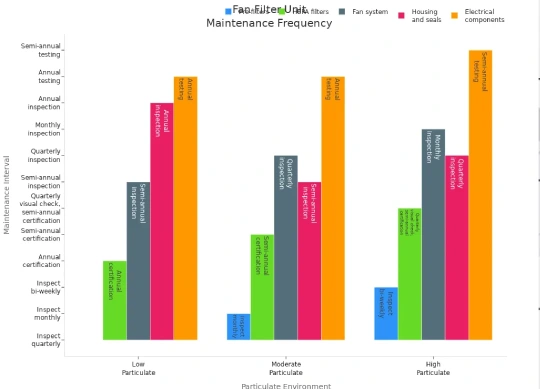
Stay on top of these tasks, and your clean room will stay safe, efficient, and ready for anything.
You want the cleanest, safest air for your facility. Fan filter units deliver top results by removing dust, fumes, and even tiny microbes, which keeps your team healthy and your equipment running strong. Linkwell brings you expert support, fast delivery, and reliable products trusted worldwide.
With Linkwell, you get help before and after your purchase, plus real-time updates and quick answers.
Ready to make your air cleaner and safer? Choose Linkwell’s FFU and Outdoor Enclosure solutions for peace of mind and lasting performance.
FAQ
How often should you replace FFU filters?
You should check filters every 3–6 months. If your space gets dusty or humid, swap them out sooner. Clean filters keep your air fresh and your equipment safe.
Can you install FFUs by yourself?
Yes, you can! Linkwell FFUs come with easy instructions and all the hardware you need. If you want extra help, Linkwell’s support team is ready to guide you.
What certifications do Linkwell FFUs have?
| Certification | What It Means |
|---|---|
| CE | Meets European safety standards |
| RoHS | No hazardous materials |
| ISO | Global quality assurance |
| UL | Reliable and safe operation |
Are FFUs noisy?
No, you’ll barely notice them. Linkwell designs FFUs with low-noise fans. You get strong airflow without the loud hum, so your workspace stays comfortable.
Can FFUs work outdoors?
Absolutely! If you use an IP-rated FFU with a Linkwell outdoor enclosure, your unit will handle rain, dust, and tough weather. Your equipment stays protected all year.
Conclusion
FFU systems are the smart choice for keeping industrial and cleanroom environments safe, efficient, and compliant. By combining high-efficiency filtration with energy-saving designs, FFUs protect sensitive equipment and create safer working conditions for your team.
With Linkwell’s expertise, durable enclosures, and reliable support, you get long-lasting performance and peace of mind. Choosing an FFU means investing in clean air, lower costs, and stronger productivity.

